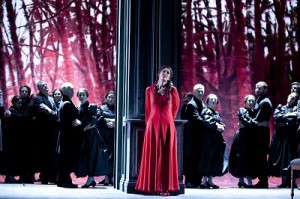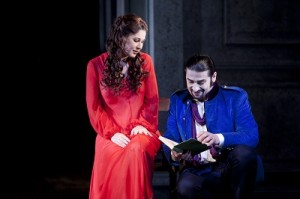IT IS refreshing indeed for Opera Australia to have introduced this production into its repertoire.
With a regular diet of Verdi, Puccini and Mozart interspersed with occasional alternative popular favourites, it was a sheer pleasure to enjoy an opera so full of real emotion and beautiful singing.But first a word for the justly-admired OA chorus, under the director of chorus master Anthony Hunt, which was superbly employed in this production, helping capture both Tchaikovsky’s nostalgic recreation of traditional rural life in Russia and the menacing grandeur of an aristocratic Moscow ball, as they descended on the protagonist from upstage.
German-born director Kasper Holten and choreographer Signe Fabricius have laboured mightily to capture the essence of Tchaikovsky’s tormented masterpiece, almost certainly a reflection of his own character as a social outsider, but this is no easy task, since the libretto owes much to Alexander Pushkin’s famous satirical poem in its reflection of subtler social issues.
This opera requires a high degree of naturalism in the acting, in part because both the central characters, Tatyana and Eugene, undergo significant character developments throughout the course of the opera.
Perhaps it was for this reason that the director chose to introduce two dancer-doppelgangers, dressed identically to the young Tatyana and Eugene, to echo and counterpoint their actions.
This device proved intrusive and at times, especially in the fatal duel that sees Onegin shoot his best friend Lensky, totally superfluous.
Other devices, such as the director’s decision to leave James Egglestone as the now dead Lensky lying dead downstage like the elephant in the room, created a visual symbol of the turn main characters’ past, but this too, while perfectly comprehensible, cluttered the stage in the action.
Additionally, a group of dancers meant to cover Onegin’s fruitless wanderings around the earth were beautiful, but seemed in style to have stepped out of quite a different production.
A touch at the end had me slightly puzzled. Was it logical that the ageing Prince Gremin, played by Russian bass, Konstantin Gorny, should overhear the final intimate exchange between the two lovers that were never meant to be? I think not, and Pushkin, if not Tchaikovsky, would certainly have been turning in his grave.
As both the young and the older Tatyana, the Australian soprano, Nicole Car, was simply radiant, capturing both the novel-fuelled romanticism of a young country girl and the grace of a mature princess at the end.
The magnificently-voiced but uncharismatic Croatian baritone, Dalibor Jenis took on the part of the difficult Eugene Onegin, at first a cynical aristocrat and later a disappointed lover. Jenis never captured the aristocratic quality of the title character, but he did bring an exciting note of torment to the famous early scene where Onegin rejects young Tatyana’s declaration of love.
Objections to the director’s diversions aside, in the end, this proved to be a compelling and moving production of a powerful opera seen too rarely in this country – it deserves the full houses it is attracting.
The post Review: Pleasure of the refreshing ‘Onegin’ appeared first on Canberra CityNews.

